Introduction
- Businesses that have expanded to foreign environments have often faced numerous political risks.
- Those risks have not only added complexities to their operations, but also impacted on their performance.
Globalization has become a phenomenon that has driven many businesses to expand their operations in the global market to seek access to resources, new opportunities and lower costs.
It is a move that has faced numerous hurdles of political risks in foreign environments and added complexities and less effectiveness to the performance of businesses.
Different studies offering conceptual frameworks of sources and effects of political risks on a business almost unanimously and insightfully define political risks as political conditions and events in a country which impact on a business environment and cause investors’ profit margins to reduce alongside with a loss of a capital (Enescu & Enescu, 2011) .
In order to appreciate how political risks may affect the operations of a business, the discussion in this paper has embraced an interdisciplinary approach. The latter will assist in studying management of businesses in a manner that can be easily understood. In addition, these risks have been approached from a point of view of a political system. This paper also analyzes political system framework and its functions and concludes by proposing remedial and proactive management policies that can be adopted and implemented by a business organization to manage political risk.
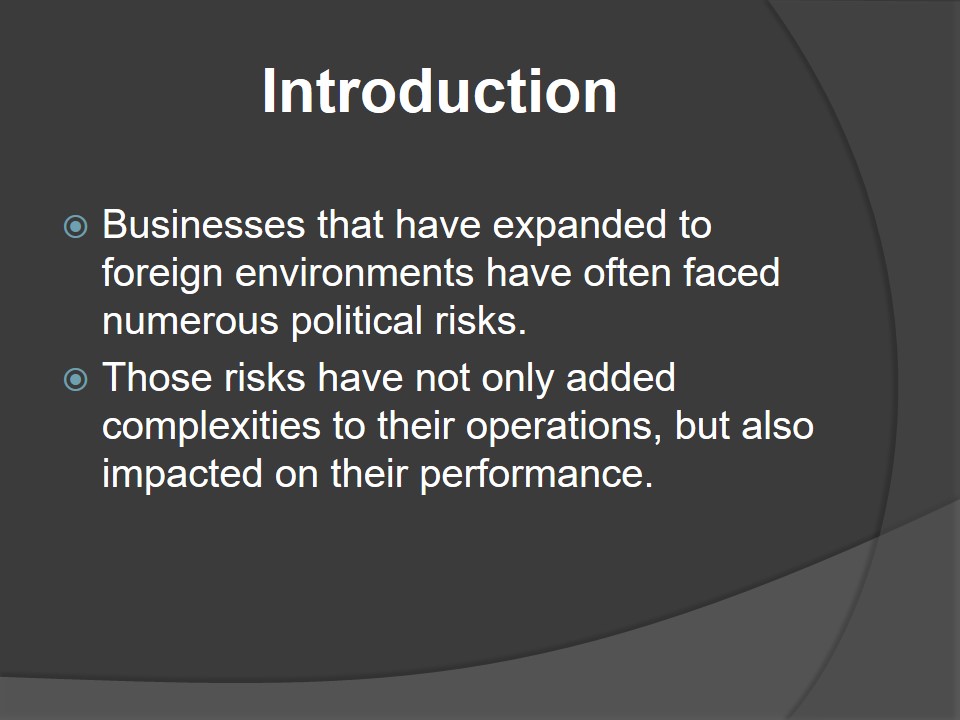
Understanding a political system framework
- A political system through set institutions can limit effective business operations.
- Institutional and legal constraints are usually not the major limitations in most business operations.
- As a matter of fact, most states usually tend to create political systems that favor smooth operations of businesses.
That definition makes it clear that such a political system has the ability to give a legitimate sanction that includes the legal power to punish, compel and enforce laws.
In their book, International Business Theories: Policies and Practices, Burmester and Tayeb (2000) are of the opinion that this is true for political systems which depend on the consent of the ruled to rule and enforce decisions.
In most cases, many studies that have tried to define a political system have related it with the application of coercion, mostly legitimate by a government, such as the use of authority, rule or power to allocate values.
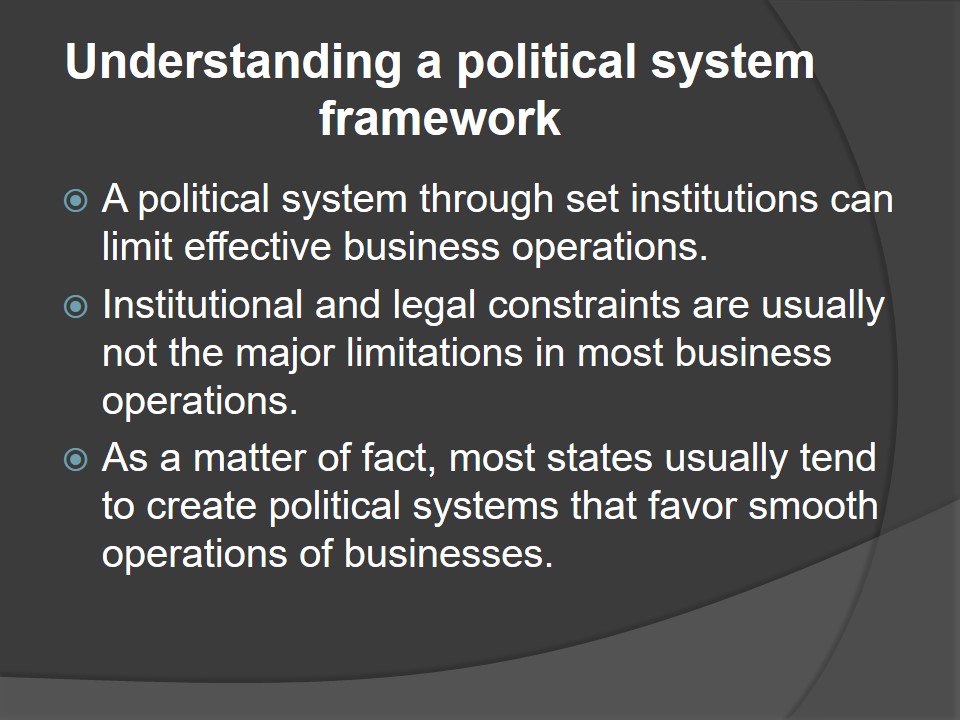
Functions of a political system in a global market
- One of the major functions of a political system is an internal conversion process whereby inputs, such as supports and demands, are transformed into several outputs.
- Support and demand factors may not be real threats and points of consideration in certain marketing environments.
- However, they may greatly interfere with the wellbeing of a business.
- Many political systems have set up institutions or political structures to initiate and process inputs and then transform them in order to create outputs.
- All demands used to get into a political system are combined by the set institutions.
- They are then aggregated or articulated in order to be converted into regulation rules and policies to be adjudicated and enforced.
- Another function of a political system is its interaction, adaptation and maintenance of a given business environment.
- It is the political system in a particular global market environment that determines business operations.
In his publication, Click (2005) points out that input in demand can be grouped under various inputs; it symbolizes how much political systems have been dedicated to pursuit democracy, market dominance, crafting as well as implantation of policies, control of behavior as well as governing safety of products in addition to demand and supply of services and goods.
It is important to note that support inputs are of great significance to the political systems because the last tries to convert them into outputs. On the other hand, support inputs are factors that involve allocation of public funds, other material support, obedience to regulation and laws and participations in political activism.
Reports from Pricewaterhouse Coopers indicate that in the current increasingly competitive global market, many political systems have set up institutions or political structures that process and initiate inputs and then transform them in order to create outputsEccles, Newquest and Schatz (2007) point out that other related bodies, as studied by the Eurasia Group, include a governmental bureaucratic agencies that enforce rules and the judiciary which adjudicate the rules. Eccles, Newquest and Schatz conclude by indicating that information on outputs and inputs within a political system is disseminated via political communication.
It is important to note that the mentioned processes are conducted by the set of institutions which includes lobbyists and NGO’s which articulate demands or interests, political parties that follow interest aggregation and a government rule-makers whose tasks are to form binding rules through conversion of policies.
As such, the capabilities and performance of a business in that global market will be determined by the outputs of a political system
Indeed, the latter attempts to explain why a business establishment may not elude the realities posed by political systems within its operating environment (Buckley and Lessard, 2005).
Dutta and Roy (2011) concur with Buckley and Lessard and indicate that the incumbents of important roles in a political system are charged with the duty of maintaining a political culture, values, beliefs and attitudes which capture the notions of their economic and political ideologies regarding the nature of an economy and government desired.
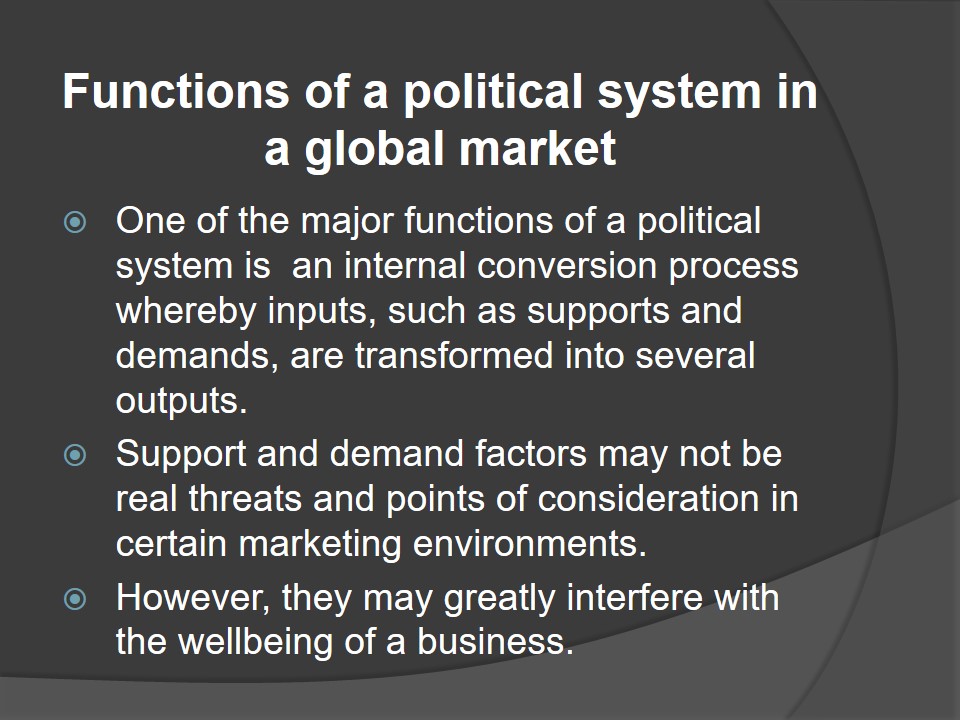
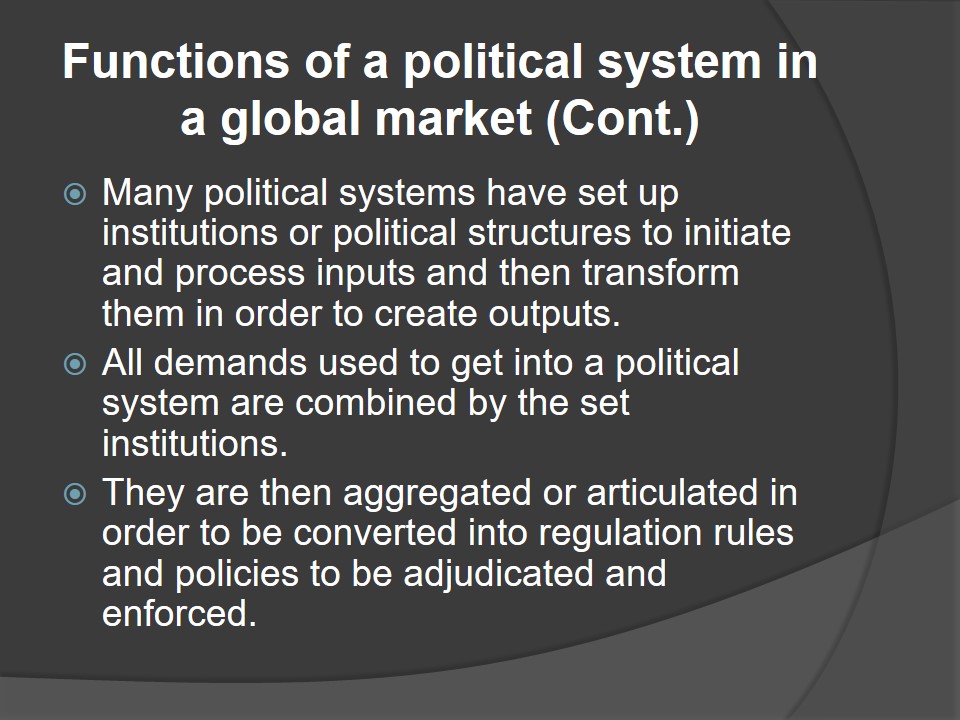
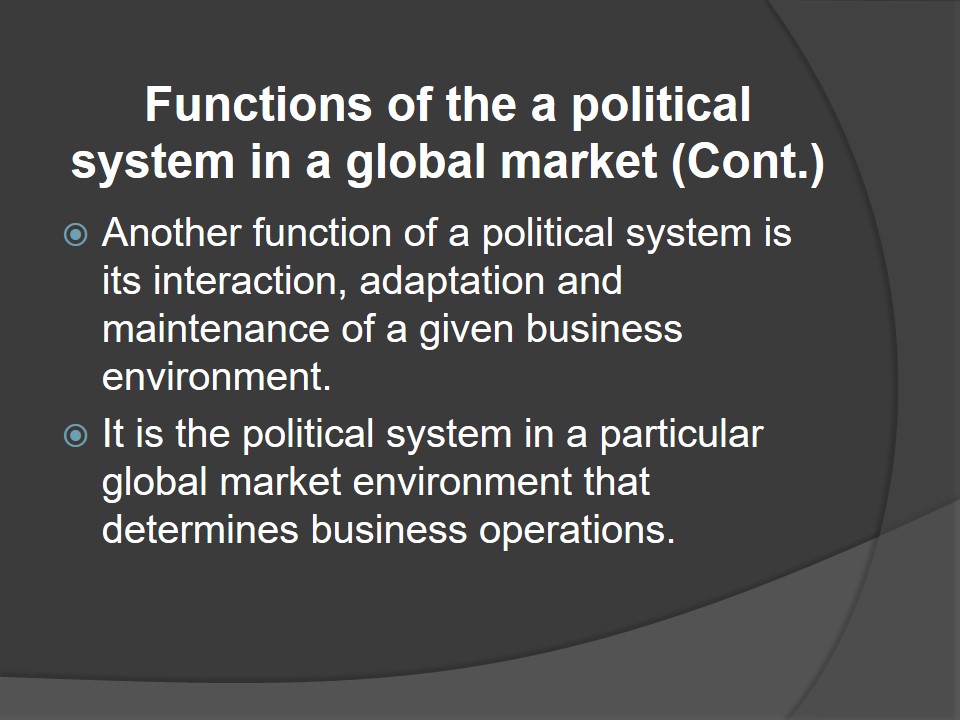
Risks involved
- In a global market environment, risks emerge from certain conditions which are embedded in the context of a political system.
- Maroo (2011) indicates in his article At the Crossroads that the sources of political risks spring from an external or domestic environment.
- After emerging, the risk follow an indirect or direct sequential path to a level where it impacts on a global business strategy and the profitability of an industry.
- One of the many dangers posed by political risks on the implementation of a global strategy is threat.
- A political organization can pose a threat to the strategies, interests, opportunities and operations of a global firm in a particular market.
- Threats from a political organization may be observed as expressions of a strong intention to inflict harm or damage to a firm.
The flow of political risks may become multifaceted owing to a nature of the organization’s transnational activities, internationalization of domestic politics and how a business has been globalized.
Organizational and strategic management theories refer to uncertainty created as an unpredictability of organizational or environmental variables which affect and impact negatively on corporate performance.
Nolan, Sourgens and Totino (2011) point out that threats which are politically based can cause a business with global strategies to develop a sense of uncertainty.
In addition, Nolan, Sourgens and Totino argue that a threat may also include ideologies on value changes that a political organization uses to target a firm’s profitability. It may be a punishment or retribution for a firm’s harmful products, poor workplace conditions or some project that a firm has failed to complete.
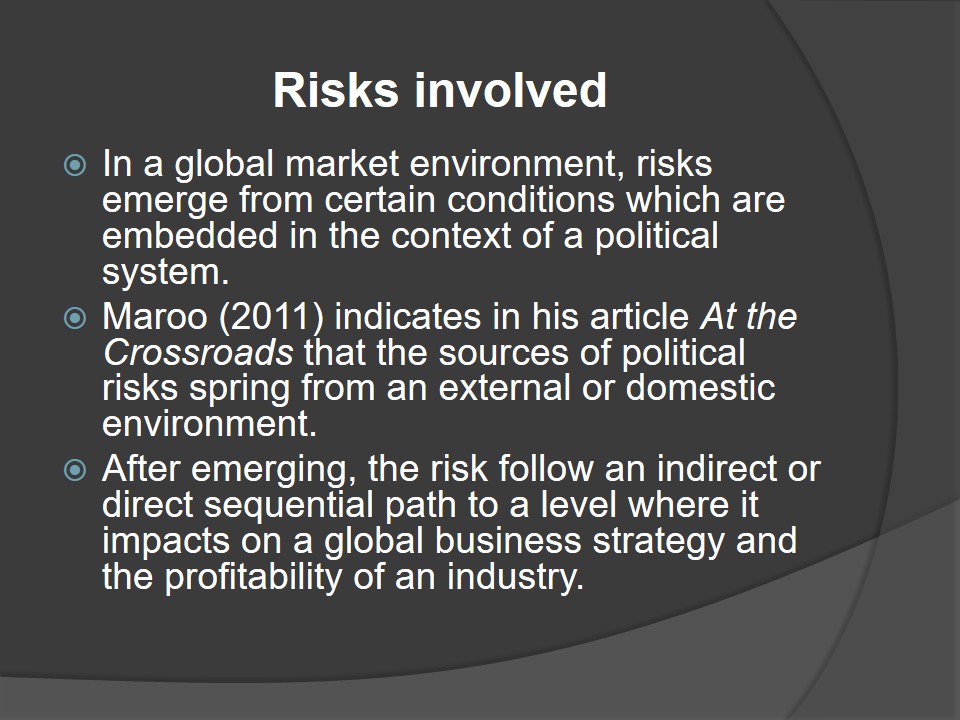
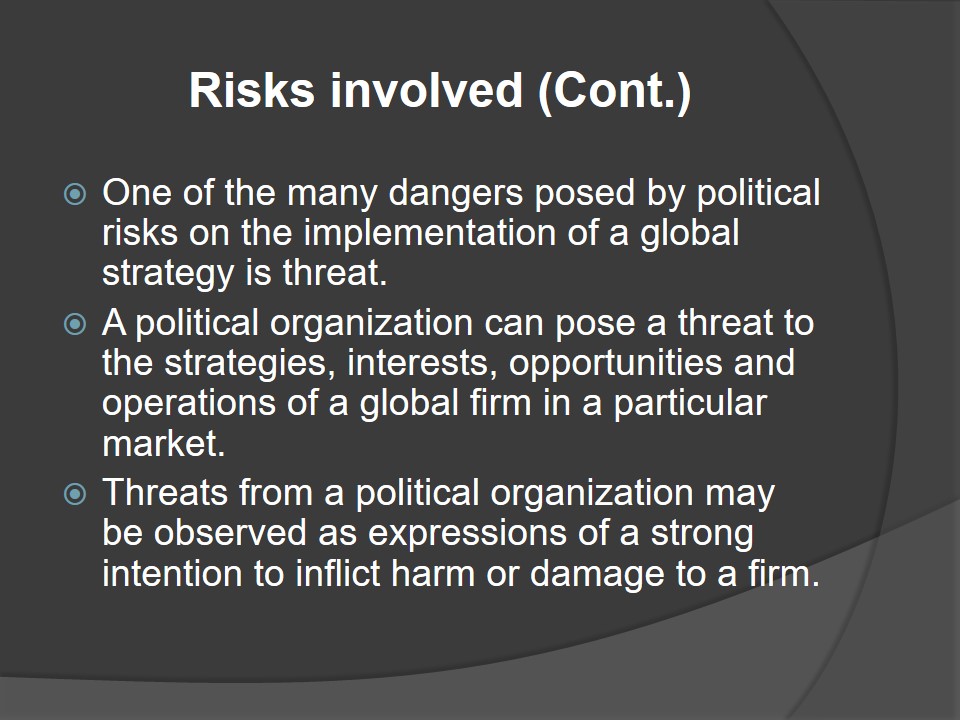
Managerial implications and recommendations
- One of the best methods to avoid problems and difficulties connected with politics that may arise in a host market is not to enter that market.
- According to Enescu and Enescu (2011), avoiding market entry to escape risks may be seen as a function of managerial inflexibility.
- It is also a conservatism in taking a bold step to exploit potentially risky but profitable market opportunities.
- Risk sharing ways such as multilateral and bilateral agreements have been considered as important methods of reducing uncertainty and potential loss of profit.
- Risk sharing is an inevitable procedure which all international businesses ought to adhere to realize any significant performance.
Developing sufficient understanding of political systems, their functioning and risks involved are important aspects that aid a business with international global strategies to develop and execute policies for appropriate risk management.
The latter may include forming an agreement which is long-term through international joint ventures and alliances with buyers and suppliers.
On the other hand, financial risk management may involve having political risk insurance and agreements on future and forward contracts.
Buckley and Lessard (2005) posit in their article Regaining the Edge for International National Business Research that effective risk sharing to overcome political issues should involve financial management and strategic management of risks.
For instance, the World Bank has insurance with the Multilateral Investment Guarantee Agency (MIGA) to keep it safe from predatory behavior from the country that hosts it even though it covers a limited range of risks which include damages, expropriation, inconvertibility and withholding of the loans (Buckley & Lessard, 2005).
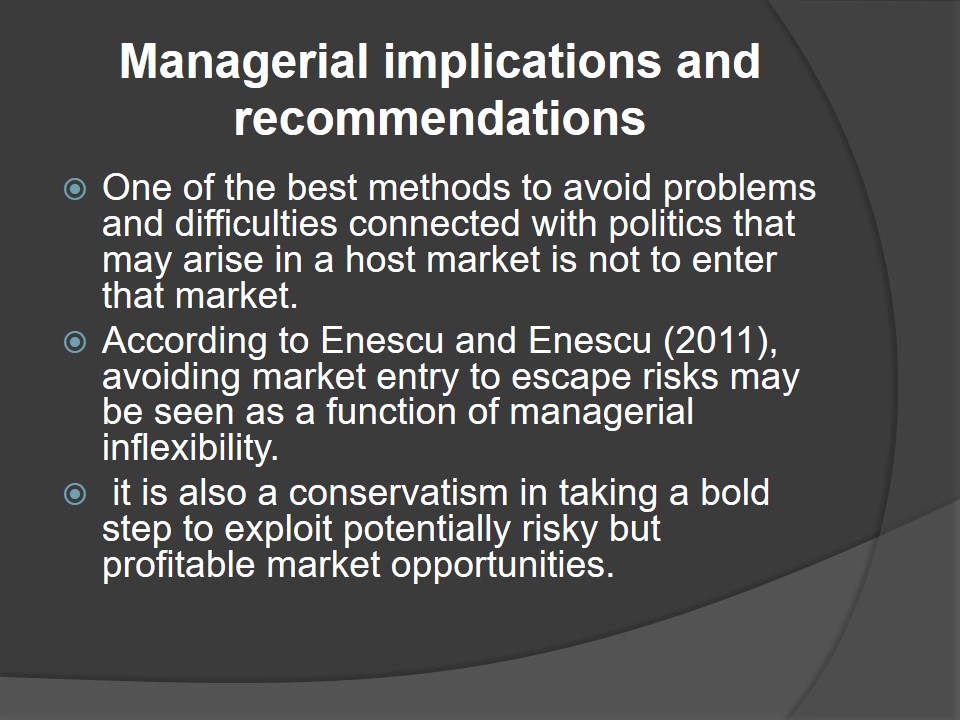
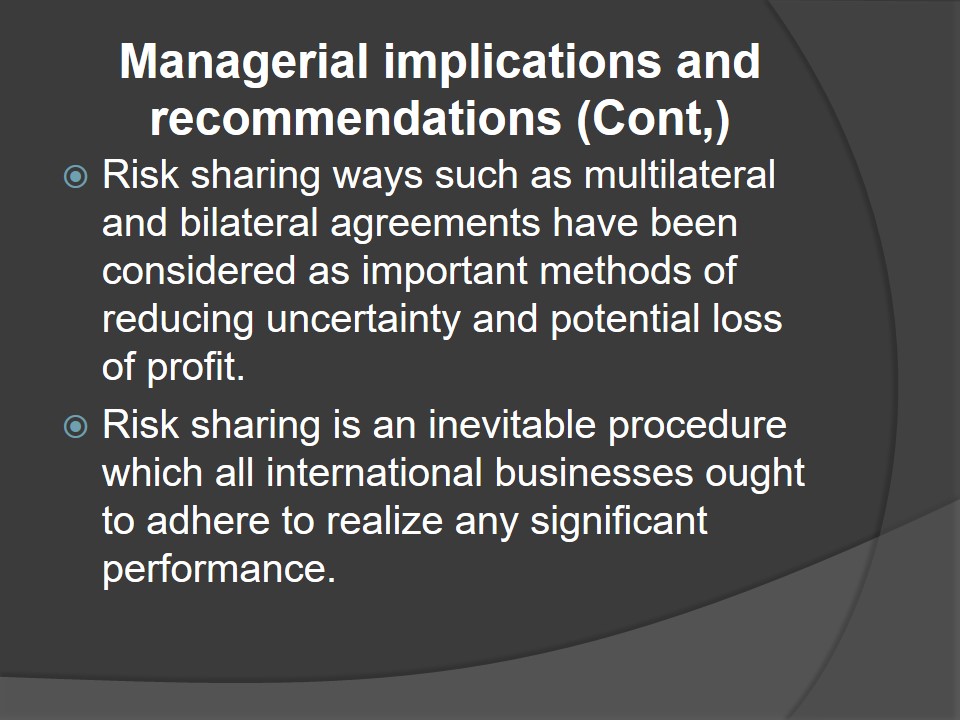
Conclusion
- From the discussion, it is clear that many companies involved in international business have global strategies but grapple with political issues which pose greater risks to their performance.
- However, companies can protect their strategies and investments as well as acquire new opportunities through understanding and effectively managing political risks.
To sum everything up, the discussion in this paper was based on the thesis statement that “globalization has become a phenomenon that has driven many businesses to expand their operations in the global market in order to seek for access to resources, new opportunities and also reduced costs”. It is a move that has faced numerous hurdles of political risks in the foreign environments and added complexities and effectiveness to the performance of businesses.
A successful management of political risks in a business systematic process can be achieved only without uncertainty and fear as discussed in the paper.
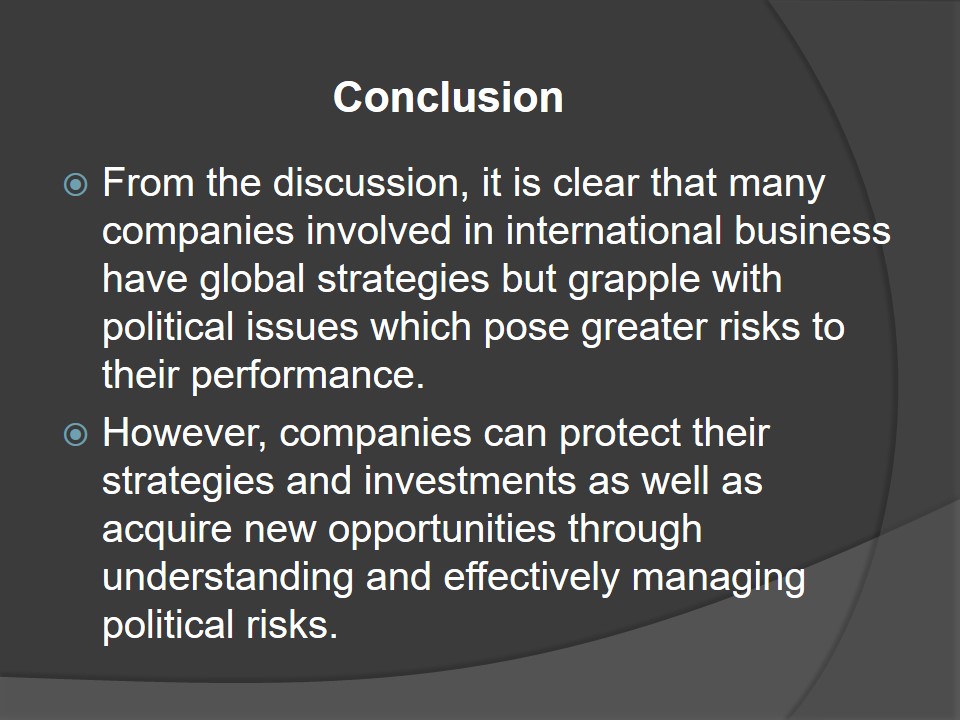
References
Buckley, P.J. & Lessard, D. R. (2005). Regaining the edge for international national business research. Journal of International Business Studies, 36(6): 595-599.
Burmester, B. & Tayeb, M. H. (2000). International business theories: policies and practices. London, UK: Pearson.
Click, R.W. (2005). Financial and political risks in US direct foreign investments. Journal of International Business Studies, 36(5): 559-575.
Dutta, N. & Roy, S. (2011). Foreign direct investment, financial development and political risks. The Journal of Developing Areas, 44(2), 303-327.
Eccles, R.G., Newquest, S. C. & Schatz R. (2007). Reputation and its risks. Harvard Business Review, 85(2): 104-114.
Enescu, M. & Enescu, M. (2011). Achieving optimal business performance and the risk management system. Economics, Management and Financial Markets, 6(2), 816-820.
Maroo, J. (2011). At the crossroads. Energy Risk, 22-26.
Nolan, M., Sourgens, F., & Totino, C. (2011). Recent trends in public political risk insurance coverage. Corporate Finance Review, 15(6), 13-18.
Patrick, S. (2011). The brutal truth. Foreign Policy. Web.